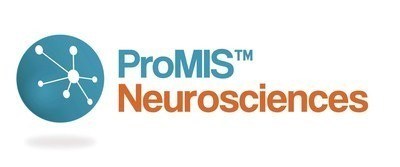ProMIS Neurosciences outlines best-in-class approach to amyloid-beta-targeting drug candidates for Alzheimer's disease
Dr. Johanne Kaplan highlights need for precision selectivity for the toxic form of amyloid beta in narrated overview
TORONTO and CAMBRIDGE, MA, Nov. 7, 2019 /PRNewswire/ - ProMIS Neurosciences, Inc. (TSX: PMN) (OTCQB: ARFXF), a biotechnology company focused on the discovery and development of antibody therapeutics targeting toxic oligomers implicated in the development of neurodegenerative diseases, posted a narrated overview of its next-generation amyloid-beta (Aβ)-targeting drug candidate, PMN310 for Alzheimer's disease (AD), juxtaposed with Biogen's first-generation candidate, aducanumab. The narrative details PMN310's superior binding to the toxic form of Aβ, amyloid beta oligomers (AßOs), potentially without the dose-limiting side effect, ARIA-E (brain swelling), associated with aducanumab. Upon regulatory approval of aducanumab, PMN310 is positioned to be a next-generation, amyloid-beta-targeting candidate for AD.

Biogen has announced plans to submit aducanumab to the U.S. Food and Drug administration (FDA) for approval. As part of its announcement, the company noted the potential implication of its decision for similar approaches targeting amyloid beta. As a next-generation approach to targeting Aβ, PMN310 offers precision selectivity for AßOs, which hundreds of studies indicate are a root cause of neuronal death in AD. In pre-clinical studies, PMN310, unlike aducanumab, shows virtually no binding to amyloid plaque, suggesting a best-in-class profile with an opportunity for higher dosing without ARIA-E.
Stated Dr. Johanne Kaplan, Chief Development Officer for ProMIS Neurosciences: "As the renowned neuroscience leader Dr. Dennis J. Selkoe wrote in a recent STAT First Opinion byline, the first therapy for Alzheimer's will 'open the floodgates to make better versions.' PMN310 could be the first of these better versions. Pre-clinical data show PMN310 can neutralize toxic oligomers without binding to plaque. Plaque binding is associated with the dose-limiting brain swelling observed in 35% of the patients given aducanumab in its phase 3 program. In many chronic conditions, first generation therapies are often clinically eclipsed by better versions. PMN310 is on track to provide this better version, achieving greater therapeutic potency for patients without the dose-limiting side effect of brain swelling." ("Biogen's good news on aducanumab could 'open the floodgates' for Alzheimer's drugs," by Dennis J. Selkoe, October 23, 2019)
To access Dr. Kaplan's narrated deck, click here: http://bit.ly/ProMIS110719
To learn more about the role of amyloid beta in Alzheimer's disease including evidence implicating the toxic oligomer, tune into Saving Minds, at iTunes or Spotify.
About ProMIS Neurosciences
ProMIS Neurosciences, Inc. is a development stage biotechnology company focused on discovering and developing antibody therapeutics selectively targeting toxic oligomers implicated in the development and progression of neurodegenerative diseases, in particular Alzheimer's disease (AD), amyotrophic lateral sclerosis (ALS) and Parkinson's disease (PD). The Company's proprietary target discovery platform is based on the use of two complementary thermodynamic, computational discovery engines – ProMIS and Collective Coordinates – to predict novel targets known as Disease Specific Epitopes on the molecular surface of misfolded proteins. Using this unique precision approach, the Company is developing novel antibody therapeutics for AD, ALS and PD. ProMIS is headquartered in Toronto, Ontario, with offices in Cambridge, Massachusetts. ProMIS is listed on the Toronto Stock Exchange under the symbol PMN, and on the OTCQB Venture Market under the symbol ARFXF.
Visit us at www.promisneurosciences.com, follow us on Twitter and LinkedIn
The TSX has not reviewed and does not accept responsibility for the adequacy or accuracy of this release. This information release contains certain forward-looking information. Such information involves known and unknown risks, uncertainties and other factors that may cause actual results, performance or achievements to be materially different from those implied by statements herein, and therefore these statements should not be read as guarantees of future performance or results. All forward-looking statements are based on the Company's current beliefs as well as assumptions made by and information currently available to it as well as other factors. Readers are cautioned not to place undue reliance on these forward-looking statements, which speak only as of the date of this press release. Due to risks and uncertainties, including the risks and uncertainties identified by the Company in its public securities filings, actual events may differ materially from current expectations. The Company disclaims any intention or obligation to update or revise any forward-looking statements, whether as a result of new information, future events or otherwise.
![]() View original content to download multimedia:http://www.prnewswire.com/news-releases/promis-neurosciences-outlines-best-in-class-approach-to-amyloid-beta-targeting-drug-candidates-for-alzheimers-disease-300953376.html
View original content to download multimedia:http://www.prnewswire.com/news-releases/promis-neurosciences-outlines-best-in-class-approach-to-amyloid-beta-targeting-drug-candidates-for-alzheimers-disease-300953376.html
SOURCE ProMIS Neurosciences Inc.
Released November 7, 2019